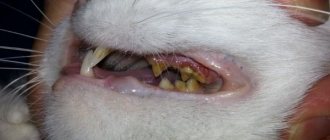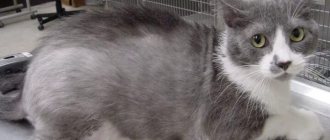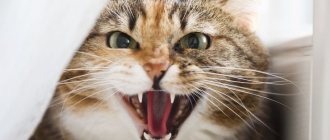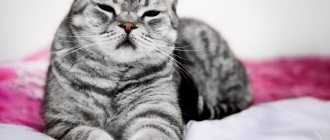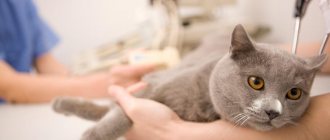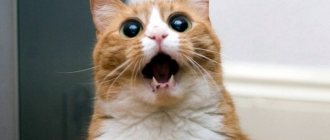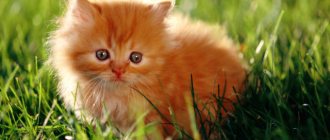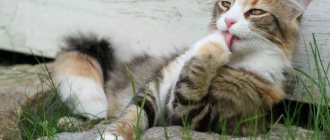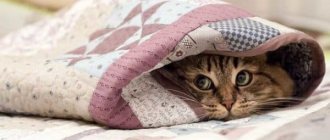Small animals can sometimes be very funny, so it is interesting to observe the behavior of pets. Of course, their actions need to be corrected. Especially if you are raising a kitten. Large pets can also behave incomprehensibly, puzzling the owner. The cat's actions can be so funny that owners don't have to lose heart. But the reasons for your four-legged friend's actions may remain unclear. Does your pet manage to lick your hands and face? Let's think about why the cat does this.
Communication between cat and owner
Our pets are loyal and open to communication. And if you want to find yourself a loyal friend who will simply be nearby and give you good emotions, get an animal. But now I would like to talk about an interesting phenomenon in the behavior of cats. You've probably seen a cat lick a person's hands or face. There are reasons for this:
- Your pet wants to show you love. While humans can express feelings through words or hugs, cats have other methods. This behavior is instinctive, and later we will look at why the pet exhibits it. You may already understand what we're talking about. But for now let's move on to the next point;
- Each animal has its own territory and “its own owner.” Therefore, with this behavior, the cat simply designates you as a member of the family. There is another option, when the pet does not perceive the owner as the main one, but, on the contrary, tries to clean it like a junior;
- You are in a bad mood and your pet wants to feel sorry for you. The cat also reacts to its stress. If you notice that your four-legged companion spends a long time cleaning himself, it could be stress. Or dermatological problems. But if an animal likes to lick a person, then she wants to comfort you.
No matter how rough your pet’s tongue is, you should always accept his affection and care. After all, this is how your pet expresses her feelings, wants to distract you from negative experiences, and feel sorry for you. There are other reasons, for example, the desire to get a treat. But even in this case, the animal shows sincere love for you. Why a cat likes to lick a person’s hands is a rather broad question. To understand your pet, you need to observe and communicate with him. Each animal has its own unique character. Yes, and a person influences the behavior of a pet. We talk about his actions, parenting methods, reactions to pranks and satisfaction of food needs.
There is no doubt that felines can be very smart and funny at the same time. And in their behavior you can find care for a person, their owner. Where there is a cat, there is an opportunity to console yourself and enjoy pleasant communication with the animal.
Reasons for the unusual cat habit
Any animal is attached to its owner. It is generally accepted that cats are loners by nature, loving to “stand their ground.” But not everyone should be considered that way. Cats, like people, have different personalities. Some animals absolutely cannot do without their owner and start licking him for an hour.
The main reasons why a cat licks a person are:
- thermoregulation;
- reaction to odors;
- expression of love;
- maternal instincts;
- dominant or passive behavior;
- lack of attention;
- diseases.
Everyone knows that a cat’s body temperature is much higher than a human’s. It is almost 39 degrees. Due to this, cats are extremely thermophilic and require large amounts of heat to warm their bodies. The human body emits a huge amount of heat, which is very attractive to your pet.
Many owners notice that cats prefer to lie down and start licking exactly the place where pain occurs in humans. This is explained by the fact that the diseased organ produces increased heat, which in turn is greatly preferred by representatives of the cat family.
Cats have always been attracted to different smells. For example, they love the smell coming from human hair. Especially after washing your hair. The cat perceives hair as “fur” on humans, so it licks it.
To avoid additional “washing” of your hair, it is recommended to use citrus-scented shampoos. You can also distract your pet from licking with food or toys.
The reason why a cat licks its owner can also be explained as follows . While being in close proximity to a person, the pet experiences such a pleasant feeling of comfort and calm.
If a pet shows an active interest in the child in the house, then it is likely that she perceives the human child as her own. The mother cat is always nearby and constantly licks her babies. For this reason, a “dose” of washing and sleeping in an embrace with a “furry mommy” in such a situation are provided to the child without fail.
In order to avoid some discomfort during sleep, the cat owner is not recommended to accustom her pet to sleep with people. It is important to note that if the animal has not undergone the procedure of castration or sterilization, but has not produced offspring, cats exhibit false maternal instincts. Cats may experience hormonal imbalances. Therefore, it is important for owners who do not plan to breed offspring to resolve this issue in a timely manner.
Persistent licking of the owner's hands or face can be a kind of signal for help for various diseases in the animal . For example, it may be bothered by parasites in its fur, so it becomes restless and licks not only itself, but also people. If you suspect any disease, it is better not to start self-medication, but to consult a specialist.
Licking a person due to lack of attention
Cats deprived of attention will strive to take out their anger on objects in the apartment, and repeated refusals can lead to a complete loss of trust, which will be very difficult to restore. Some aggressive cats may even bite their owner.
A sign of an invitation to groom a cat is:
- ears pressed to the back;
- nose pokes in the hand;
- and licking of hands and face.
Sometimes this causes the pet to lie flat on the floor or other surfaces. In addition, the cat can lick the face, demonstrating its affection for the owner. Usually the animal itself turns to the owner with a certain part of its body, showing exactly where it should be scratched.
The most pleasant areas for scratching in cats are the forehead and ears. It is more correct to scratch the forehead against the grain, and the ears at the base, gently pulling. Some animals allow their owner to scratch their belly, and many enjoy scratching during shedding. You should not make small intermittent movements, as the pet will receive greater pleasure from continuous combing - from head to tail.
Many animals begin to emit a gentle purr when scratched. Such sounds are confirmation that the pet is experiencing pleasure, and grooming should continue.
As a sign of affection, cats lick the owner's face and hands. You can start scratching your cat without calling him. You should extend your hand in his direction and scratch 10 centimeters from him. If your pet, with its ears flattened, approaches your hand and licks it, this is a good sign. It means the call for grooming has been accepted.
Licking kittens and humans: what are the similarities?
It is not without reason that a cat shows care by licking. Even in childhood, your mother cat took such care of your pet. This action is associated with pleasant emotions that are associated with safety and protection. Have you noticed how a cat licks kittens? In fact, there is something similar in the behavior of a pet with a person. Cat love manifests itself in different ways, but it is through licking that the mother takes care of the kitten. She hides him from predators by licking his scent, and also teaches him to care for her fur. But even in the usual washing of children, the cat shows maternal affection.
In other cases, the owners observed that small predators can also lick each other. If your cat shows you such caring attitude, then he perceives you as part of his family.
Why do cats lick themselves?
The reasons why these animals lick themselves all the time are not always as harmless as they seem. Sometimes such licking indicates illness. To understand that it is time to sound the alarm, the owner of such a pet should know why the cat licks itself all the time, paying special attention to certain areas of the body, for example, the area near the anus or nose.
Hygiene, grooming
After contact with other animals and people, cats tidy up their fur. During the washing process, the pet is relaxed and completely focused on the cleanliness of its coat. When washing, he does not focus on one part of the body, paying equal attention to the tail, paws and muzzle. Usually, after the procedure is completed, the animal quietly dozes.
Self-soothing, stress relief
Cats are very vulnerable animals. Any event, be it a change of residence, a trip to the veterinary clinic, family quarrels, the arrival of a new pet in the house or rough treatment, can cause stress in them. Some cats, experiencing strong emotional stress, begin to actively lick their lips. Why do they do this and how does it relate to negative emotions?
Some people, when worried or nervous, bite their nails or bite their lips. Cats lick themselves. So both of them try to protect themselves from an unpleasant situation, transferring the reaction from an inaccessible object or action that they cannot influence to an accessible one.
Trying to get rid of skin parasites
If your pet constantly licks itself and shakes its head, creating the feeling that it is gnawing something out of its fur, most likely it is tormented by skin parasites: fleas, lice eaters, ticks. An animal infected with ectoparasites becomes restless and lethargic, sleeps and eats poorly, and the condition of its coat deteriorates. It is wrong to think that outdoor pests can only affect stray cats or those who are often outdoors. Any pet, no matter how well-groomed it may be, can pick up fleas or ticks simply by rubbing against the owner’s leg after returning from a walk.
Skin itching due to allergies, fungal infections, metabolic disorders
Your pet may constantly lick itself to relieve itchy skin, which is caused by:
- allergic reaction to food, dust, pollen of flowering plants, medications, etc.;
- skin lesions due to fungal infection;
- metabolic disorders.
Allergies do not pose a danger to a cat if treatment is started in a timely manner. Usually it is enough to exclude your pet from contact with the allergen, and the symptoms of an allergic reaction will disappear. A fungal infection can be easily recognized by a number of signs:
- baldness of certain parts of the cat’s body;
- bloody sores covered with scabs;
- dryness, peeling, redness or, on the contrary, pallor of the affected skin.
Itching in the anus due to worms
If your pet is licking under its tail, this may indicate that it has worms. Some types of helminths cause itching in the anus, causing the animal to become restless, sleep poorly and eat poorly. The cat owner needs to examine the contents of the cat's litter box. When a pet is infected with helminthiasis, parasites can be found in its feces. Ignoring the symptoms of this disease can have serious consequences for your cat's health.
Inflammation of the paraanal glands
Why does an animal lick its anus, ride its butt and chew its tail? This behavior may be caused by inflammation of the paraanal glands, which are located on both sides of the anus and serve to produce a special odorous substance necessary for contact with fellow animals. Sometimes these glands become clogged and inflamed, causing significant discomfort to their owner. This usually occurs due to frequent constipation and decreased muscle tone.
How does a cat become domestic and loyal?
The first few days of your interaction with your cat can affect subsequent trust. A small animal must adapt after moving to a new home. And if this is also a new owner, especially after weaning from the mother, then you have to work a little with the baby’s sense of security. Comfort and trust are closely related. And at the very moment the kitten meets a new person and the first few weeks, the owner is responsible for the emergence of a trusting relationship. If at an older age you observe licking the owner’s hands, then your cat has gone through the adaptation process well and an emotional attachment has arisen. Sometimes it can be quite difficult to win over a pet, but many owners still succeed. The most important thing is to treat the animal well.
Is your cat sick?
There is also some not entirely pleasant information about why cats lick themselves and their owners. According to one version, the cat reacts with this behavior to skin diseases or parasites. In order to accurately determine whether there is any need to worry, the animal must be examined by a doctor. Beforehand, at home, you can identify whether there are reasons to worry. Rashes, dermatitis, and lichen will be noticeable. But to find out whether there are worms, monitoring the cat’s appetite, its well-being and feces will help.
You will be able to notice from the behavior of the predator what the mystery of this phenomenon lies. When she licks her owner's hands, she can do it with love or confusion. Observe your pet's behavior. Perhaps she just wants to show how she feels about you.
What other reasons for licking?
Another option is if the cat is licking itself just to keep itself busy. Let's say it's raining outside or the owner is constantly busy. In the second case, try to pay attention to your pet, because a cat can lick itself if it wants to feel calm. For large or small pets, the care and affection of the owner is extremely important. You can replace a family for kittens and therefore you should try not to offend them.
We have looked at the most common reasons why a cat licks its owner. This behavior expresses natural instincts, as well as the predator’s care for herself and her younger kittens. If a pet licks its owner, it trusts him. You need to maintain communication with your pet as often as possible. Otherwise, small predators may lick themselves out of boredom.
The pet can also lick its hair. The reasons may be the desire to give or receive attention, the desire for care or dominance. Some owners of furry cats say that the cat may begin to zealously wash away the “dangerous” smell of shampoo, trying to save the owner. As you can see, even toxic substances on the hair sometimes do not become an obstacle.
Pay attention to whether you have recently eaten meat, fish or other tasty food. If the smell remains on your hands, the cat will feel it and lick it off. But here there are two explanations. In the first case, the animal wants to eat. In the second, she hides you and herself from danger. In nature, such a smell could be smelled by predators.
When is there nothing to worry about?
By studying the behavior of cats of different breeds and ages, animal psychologists were able to identify several factors that explain feline tenderness.
- Declaration of love. Licking is one of the main means of communication for cats. The first thing a newly born kitten feels is the touch of its mother’s tongue on its fur. A cat and a cat that have reached puberty lick each other, showing tenderness. So, if a cat licks its owner, it recognizes that he is dear to her. She feels comfortable and safe next to him.
- Striving for purity. Cats are one of the cleanest animals. They constantly wash themselves, clean their fur and claws. This behavior is determined by instinct, which was formed back in the days when their wild ancestors lived and hunted in the wild. A foreign smell can attract the enemy and also scare away prey. The smells of soap or cream are unnatural for your pet, which means you need to help the person get rid of them. Thus, by licking their owners, cats try to make him clean according to their cat concepts and at the same time take care of his safety.
Hygiene
- Begging for food. This reason is more typical for animals that were bottle-fed from an early age. For them, human hands are associated with receiving food, and licking and biting the palm or fingers is a common way to ask for a treat.
- False maternal instinct. Usually manifests itself in individuals who have reached sexual maturity, but are deprived of sexual contact. The cat needs to somehow realize its maternal instinct, and it repeats the behavior of its mother, who showed love and care by licking the kittens. If measures are not taken, then in the future an excess of hormones can provoke a dangerous condition - a false pregnancy. Hormonal imbalance can also affect an uncastrated adult male. To prevent health problems, it is necessary to either find a partner for your pet, or have them spayed or neutered.
- Dominant behavior. By licking his hands, the pet may not be asking for a favor, but, on the contrary, condescendingly doing a favor. This is how he shows his dominance in relationships, transferring a person to a level below himself. You can allow your pet to assert itself until it begins to show aggression.
- Stress can cause ingratiating behavior in a cat. By licking the owner, the animal recognizes its subordinate position, inability and unwillingness to defend itself. It is necessary to help your pet get rid of oppressive anxiety, otherwise constant fears and complexes can lead to health problems.
